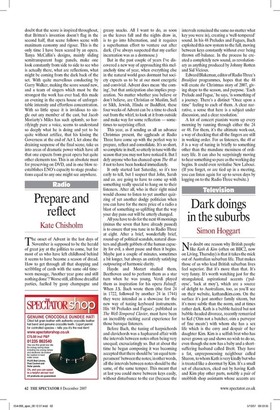Prepare and reflect
Kate Chisholm The onset of Advent in the last days of November is supposed to be the herald of great joy at the jollities to come, but for most of us who have left childhood behind it seems to have become a season of dread. How to get through all that shopping and scribbling of cards with the same old timeworn message, Another year gone and still nothing done'? Worse still, all those dreadful parties, fuelled by gassy champagne and greasy snacks. All I want to do, as soon as the leaves fall and the nights draw in, is to go into hibernation, and it requires a superhuman effort to venture out after dark. (I've always suspected that my earlier incarnation was as a dormouse.) But in the past couple of years I've discovered a new way of approaching this melancholy time of year, when everything else in the natural world goes dormant but society expects us to be at our most energetic and convivial. Advent does mean 'the coming', but that anticipation also implies preparation. No matter whether you believe or don't believe, are Christian or Muslim, Sufi or Sikh, Jewish, Hindu or Buddhist, these four weeks of Advent can be a time to check out from the whirl, to look at it from outside and make way for some reflection — sometimes to surprising effect.
This year, as if sending us all an advance Christmas present, the eggheads at Radio Three have come up with the perfect way to prepare, reflect and consolidate. It's so short, so complete in itself, so utterly in tune with the season that you may not have noticed it. But I defy anyone who has chanced upon The 48 at 8 not to have been hooked immediately.
It only started last Saturday, so it's too early to tell, but I suspect that John, Sarah and co. are going to have to come up with something really special to hang on to their listeners. After all, who in their right mind would choose to listen to yet another quizzing of yet another dodgy politician when you can have for the mere price of a radio a blast of something so uplifting that the way your day pans out will be utterly changed.
All you have to do for the next 48 mornings (minus the seven that have already passed) is to ensure that you tune in to Radio Three at eight. After a brief wonderfully brief, round-up of political scandals, natural disasters and ghastly gobbets of the human capacity for evil, a short pause and then it begins. Maybe just a couple of minutes, sometimes a bit longer, but always an entirely satisfying outpouring of harmonic clarity.
Haydn and Mozart studied them, Beethoven used to perform them as a star turn when he was young, Verdi played them as inspiration for his opera Falstaff. When J.S. Bach wrote them (the first 24 in 1722, followed by another 24 in 1744) they were intended as a showcase for the new way of tuning keyboard instruments. His '48 Preludes and Fugues', published as The Well-Tempered Clavier, must have been an incredibly exciting aural experience for those baroque listeners.
Before Bach, the tuning of harpsichords and clavichords was a haphazard affair with the intervals between notes often being very unequal; excruciatingly so. But at about the time he began composing it was becoming accepted that there should be 'an equal temperament' between the notes; in other words, all the intervals between notes should be the same, of the same temper. This meant that at last you could move between keys easily, without disturbance to the ear (because the intervals remained the same no matter what key you were in), creating a 'well-tempered' sound. In his 48 Preludes and Fugues, Bach exploited this new system to the full, moving between keys constantly without ever being thrown off-balance. In the process he created a completely new sound, as revolutionary as anything produced by Johnny Rotten and Sid Vicious.
Edward Blakeman, editor of Radio Three's Breakfast programmes, hopes that the 48 will create the Christmas story of 2007, giving shape to the season, and purpose. 'Each Prelude and Fugue,' he says, 'is something of a journey. There's a distinct "Once upon a time" feeling to each of them. A clear narrative, a sense that here is a subject under discussion, and a clear resolution.'
A lot of concert pianists warm up every morning by running through either the 24 or 48. For them, it's the ultimate work-out, a way of checking that all the fingers are still in working order. For us listeners, the 48 at 8 is a way of tuning in briefly to something other than the mundane messiness of ordi- nary life. It can also be surprisingly moving to hear something so pure as the working day begins. It could even revitalise New Labour. (If you forget, or are tied up in a meeting, you can listen again for up to seven days by logging on to the Radio Three website.)

























































 Previous page
Previous page